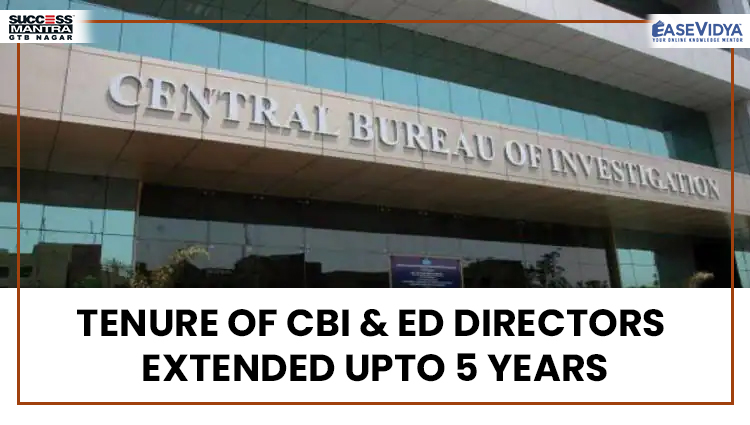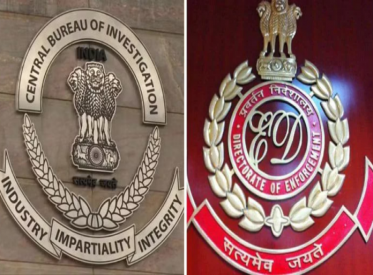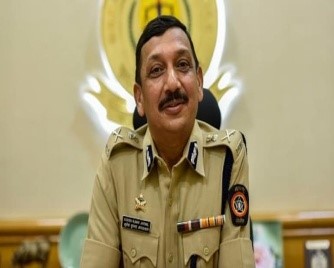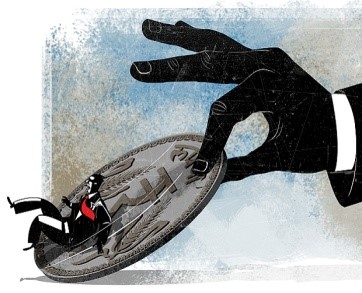
TENURE OF CBI AND ED DIRECTORS EXTENDED UPTO 5 YEARS
TENURE OF CBI & ED DIRECTORS EXTENDED UPTO 5 YEARS
Directors of the Central Bureau of Investigation (CBI) and the Enforcement Directorate (ED) may now continue in their jobs for up to five years if the government desires. Two ordinances signed by President Ram Nath Kovind have virtually extended the tenures of the chiefs of the two agencies for up to five years. Both posts currently have a fixed tenure of two years. The Delhi Special Police Establishment (DSPE) Act and The Central Vigilance Commission (CVC) Act have been amended to give the government the power to keep the two chiefs in their posts for one year after they have completed their two-year terms.
The centre's ordinance had sought three consecutive one-year term extensions for the directors of CBI and Enforcement Directorate. The current term of CBI and ED Chiefs is two years, as per the Central Vigilance Commission (CVC) Act, 2003. The centre is expected to table a law in Parliament to replace the same.
- CBI full form: Central Bureau of Investigation
- Current CBI Chief: Subodh Kumar Jaiswal (incumbent since May 25, 2021)
- ED full form: Enforcement Directorate
- Current ED Director: Sanjay Kumar Mishra (incumbent since November 19, 2018)

Current Affairs Notes By Success Mantra Coaching Institute GTB Nagar Delhi CLICK HERE
AMENDMENTS IN DSPE ACT & CVC ACT
Provided that the period for which the Director holds the office on his initial appointment may, in public interest, on the recommendation of the Committee (the committee led by the Prime Minister and leader of Opposition and CJI as members) and for the reasons to be recorded in writing, be extended up to one year at a time. Provided further that no such extension shall be granted after the completion of a period of five years in total including the period mentioned in the initial appointment.
Provided that the period for which the Director of Enforcement holds the office on his initial appointment may, in public interest, on the recommendation of the Committee (comprising of CVC chief, Revenue and Home Secretaries among others) and for the reasons to be recorded in writing, be extended up to one year at a time. Provided further that no such extension shall be granted after the completion of a period of five years in total including the period mentioned in the initial appointment.
CENTRAL BUREAU OF INVESTIGATION (CBI)
The CBI was set up in 1963 by a resolution of the Ministry of Home Affairs. Now, the CBI comes under the administrative control of the Department of Personnel and Training (DoPT) of the Ministry of Personnel, Public Grievances and Pensions. The establishment of the CBI was recommended by the Santhanam Committee on Prevention of Corruption (1962–1964). The CBI is not a statutory body. It derives its powers from the Delhi Special Police Establishment Act, 1946. The CBI is the main investigating agency of the Central Government. It also provides assistance to the Central Vigilance Commission and Lokpal. It is also the nodal police agency in India which coordinates investigations on behalf of Interpol Member countries. The CBI is headed by a Director. The CBI has jurisdiction to investigate offences pertaining to 69 Central laws, 18 State Acts and 231 offences in the IPC.
APPOINTMENT OF CBI DIRECTOR
- The Director of CBI as Inspector General of Police, Delhi Special Police Establishment, is responsible for the administration of the organisation. The Lokpal and Lokayuktas Act (2013) amended the Delhi Special Police Establishment Act (1946) and made the following changes with respect to appointment of the Director of CBI:
- Appointment Committee: The Central Government shall appoint the Director of CBI on the recommendation of a three-member committee consisting of the Prime Minister as Chairperson, the Leader of Opposition in the Lok Sabha and the Chief Justice of India or Judge of the Supreme Court (SC) nominated by him.
- The Delhi Special Police Establishment (Amendment) Act, 2014 made a change in the composition of the committee related to the appointment of the Director of CBI. It states that where there is no recognized leader of opposition in the Lok Sabha, then the leader of the single largest opposition party in the Lok Sabha would be a member of that committee.

Current Affairs Notes By Success Mantra Coaching Institute GTB Nagar Delhi CLICK HERE
DELHI SPECIAL POLICE ESTABLISHMENT ACT
The Central Bureau of Investigation traces its origin to the Special Police Establishment (SPE) which was set up in 1941 by the Government of India. The functions of the SPE then were to investigate cases of bribery and corruption in transactions with the War & Supply Deptt. Of India during World War II. Even after the end of the War, the need for a Central Government agency to investigate cases of bribery and corruption by Central Government employees was felt. The Delhi Special Police Establishment Act was therefore brought into force in 1946. The CBI's power to investigate cases is derived from this Act.
WHAT IS ENFORCEMENT DIRECTORATE (ED)?
The Enforcement Directorate (ED) is a law enforcement agency of the Government of India that is responsible for enforcing Economic Laws and fighting Economic Crime. The Directorate General of Economic Enforcement (Enforcement Directorate) is a law enforcement and economic intelligence agency responsible for enforcing economic laws and fighting economic crime in India. It was formed with the purpose of handling Exchange Control Law violations under the Foreign Exchange Regulation Act,1947. Initially established under the Department of Economic Affairs in 1956 as an ‘Enforcement Unit’, it was later shifted to the Department of Revenue for administration in 1960. It was renamed as the Enforcement Directorate (ED) in 1957. Now, the Enforcement Directorate (ED) is administered by the Department of Revenue under the Ministry of Finance. The ED has its headquarters in New Delhi and has many regional offices all over the country. It is headed by the Director of Enforcement, who is an IRS officer (Indian Revenue Service).

ED enforces the following laws:
Foreign Exchange Management Act,1999 (FEMA): The legal framework for the administration of foreign exchange transactions in India is provided by the Foreign Exchange Management Act, 1999. Under the FEMA, which came into force with effect from 1st June 2000, all transactions involving foreign exchange have been classified either as capital or current account transactions.
Prevention of Money Laundering Act, 2002 (PMLA): In India, the specific legislation dealing with money laundering is the Prevention of Money-Laundering Act (PMLA), 2002. The law was enacted to combat money laundering in India and has three main objectives :
- To prevent and control money laundering.
- To provide for confiscation and seizure of property obtained from laundered money.
- To deal with any other issue connected with money-laundering in India.
Under the PMLA Act, the Enforcement Directorate is empowered to conduct a Money Laundering investigation. Apart from the provisions of PMLA, there are other specialised provisions such as RBI/SEBI/IRDA anti-money laundering regulations.
PRAVAHINI Current Affairs Notes By Success Mantra Coaching Institute GTB Nagar Delhi CLICK HERE
TEST YOURSELF
Q.1 Recently, the Union Government has extended the tenure of Directors upto 5 years of which of the following two Government agencies?
- Central Bureau of Investigation (CBI) & Enforcement Directorate (ED): ANSWER
- Enforcement Directorate (ED) & Narcotics Control Bureau (NCB)
- National Investigation Agency (NIA) & Intelligence Bureau (IB)
- None of the above
Q.2 Recently, which of the following has been appointed as the new director of the Central Bureau of Investigation (CBI) by the central government?
- Rakesh Asthana
- Hitesh Chandra Awasthi
- Hemant Nagrale
- Subodh Kumar Jaiswal: ANSWER
Q.3 Consider the given statements & state which of the following is/are correct in the reference to Central Bureau of Investigation (CBI)?
- CBI comes under the administrative control of the Department of Personnel and Training (DoPT) of the Ministry of Home Affairs.
- The Director of CBI as Inspector General of Police, Delhi Special Police Establishment, is responsible for the administration of the organisation
- The establishment of the Central Bureau of Investigation (CBI) recommended by the Athreya Committee on Prevention of Corruption (1962–1964).
- Only II follows: ANSWER
- I & III follows
- II & III follows
- None of the above
Q.4 Which of the following appoints the director of the Central Bureau of Investigation?
- President of India
- Prime Minister of India
- Committee constituted under the chairmanship of Central Vigilance Commissioner: ANSWER
- Committee constituted under the chairmanship of the Home Minister
Q.5 Consider the given statements & state which of the following is/are correct in the reference to the Enforcement Directorate (ED)?
- The headquarters of Enforcement Directorate is in Mumbai, Maharashtra.
- Directorate of Enforcement is a Multi-Disciplinary Organization mandated with the task of enforcing the provisions of two special fiscal laws – Foreign Exchange Management Act, 1999 (FEMA) and Prevention of Money Laundering Act, 2002 (PMLA): ANSWER
- The Enforcement Directorate (ED) is administered by the Internal Security Department under the Ministry of Home Affairs.
- None of the following












0 Comment